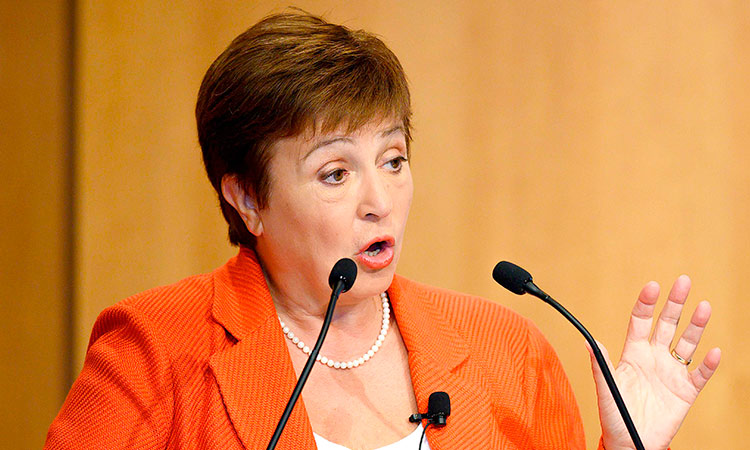BOJ should target shorter maturity yields to ease banking strain: IMF

A man rides a bicycle in front of Bank of Japan building in Tokyo. Reuters
Fiscal policy can complement the BOJ’s efforts to protect the economy from overseas risks, the global lender said, suggesting that Tokyo should not shy away from ramping up fiscal spending in the near-term despite its huge public debt.
“Strengthening the effectiveness of coordination between monetary and fiscal policy remains a high priority,” the IMF said in its Article 4 policy proposal to Japan on Monday.
While the central bank ought to maintain its massive stimulus programme, it must also find ways to mitigate the rising cost of prolonged easing and make its policy sustainable as inflation remains distant from its 2 per cent target, the IMF said.
“As it stands, both fiscal policy and monetary policy are stretched, leaving limited room to respond to shocks,” International Monetary Fund Managing Director Kristalina Georgieva told a news conference.
“The BoJ’s accommodative stance needs to continue to support reflation and growth. At the same time, financial sector oversight should be strengthened to mitigate rising financial stability risks,” she said after the Article 4 consultations.
Under a policy dubbed yield curve control (YCC), the BoJ pledges to guide short-term rates at -0.1 per cent and the 10-year bond yield around 0 per cent. While the policy has helped keep corporate borrowing costs low, it has flattened the yield curve and crushed the margin commercial banks earn from lending.
One way to ease the impact on financial institutions could be to steepen the yield curve by shifting the BoJ’s 0 per cent target for the 10-year yield to a shorter maturity, the IMF said.
Bank of Japan Governor Haruhiko Kuroda has repeatedly said if the central bank were to ease, it would seek to do so without causing an excessive fall in super-long yields. He believes that one way to keep long-term yields from falling too much could be for the government to issue more super-long bonds.
The Bank of Japan could also make its 2 per cent inflation target a more flexible, long-term goal by adopting a target range for price moves, as structural factors like technological innovation may keep inflation low for a prolonged period, it said.
Some central banks, such as those in Canada, Australia and New Zealand, started off with a pointed target but added a band to increase the degree of flexibility in monetary policy, Paul Cashin, the IMF’s Japan mission chief, told the news conference.
“It was in that capacity we made a similar recommendation,” he said.
Years of massive monetary stimulus has failed to fire up inflation to the central bank’s target, while diminishing policy ammunition and global growth risks have cast further doubt on its ability to reach its goal.
The Financial Services Agency, Japan’s banking regulator, should strength financial sector supervision and prod regional banks to diversify its business operations, the IMF said.
“In search for yield, there is more risk-taking happening in the banking system,” Georgieva said. “In Japan, the combination of low interest rates and shrinking population put an additional burden on regional banks.”
Japan’s economic growth slumped to its weakest in a year in the third quarter as soft global demand knocked exports. Analysts fret that a sales tax hike from October could also weigh on the economy.
The IMF said while the hit to consumption from the October tax hike has been moderate, there was scope for Japan to ramp up fiscal spending.
“We think there is a good possibility for Japan to pursue proactive fiscal stimulus” in the near-term, Georgieva said.
In the long run, however, Japan should seek a “gradual, further” increase in the sales tax rate to pay for the rising cost of funding an ageing population, she said.
“We think there is more space - not immediately but over time - for Japan to rely more on the consumption tax.”
Last month the Bank of Japan kept monetary policy steady as expected but gave the strongest signal to date that it may cut interest rates in the near future, underscoring its concern that overseas risks could derail a fragile economic recovery. BOJ Governor Haruhiko Kuroda said the central bank still had room to take already negative rates even lower to prevent global uncertainties from hurting the world’s third-largest economy.
Reuters







